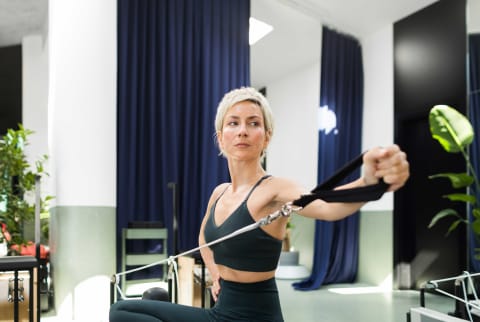Advertisement
The Best Type Of Exercise To Relieve Menopause Symptoms


Exercise has well-documented benefits for overall longevity, mental health, metabolism, and more—but can it also help with menopause symptoms? On an episode of the mindbodygreen podcast, neuroscientist Lisa Mosconi, Ph.D., author of The Menopause Brain, says yes—with a nuanced approach, that is.
The best exercises for menopause symptoms
"The research that we have shows a consistent pattern of benefits depending on the type of exercise you're doing," Mosconi says. Here, she explains how to pick the right exercise for your menopause symptoms and why it helps:
For temperature regulation: Cardio
"Cardio seems to be especially helpful for thermal regulation1, body temperature, [and] it really helps mitigate hot flashes and night sweats," she notes. "[It] also seems to help for cognitive health2, cognitive performance, and brain fog."
While running is a popular form of cardio, it's certainly not the only one. You can test out cycling, speed walking, stair climbing, jump roping, and so on to find a form you truly enjoy if running isn't your cup of tea.
For mood & muscle mass: Strength training
Strength training, on the other hand, has been shown to help activate cellular metabolism, preserve muscle mass and bone health, and improve mood3, she says.
"Some women really experience anger and irritability, even rage, during menopause," she notes. "Strength training seems to be helping at least some women relieve some of their tension." So while cardio may be a popular choice for mood benefits, strength training is another worthy option.
Plus, building muscle mass is critical for women in menopause, partly to support metabolism.
We know that poor metabolic health is linked to a host of health concerns, one of which is worse menopausal symptoms4. So, by improving metabolic health, you may be able to ease some of those symptoms simultaneously.
Optimizing your metabolic health also includes preserving muscle mass5—one of the many reasons strength training can be so beneficial for menopause.
For stress & sleep: Yoga and Pilates
As for balance and flexibility exercises (think yoga, Pilates, tai chi, etc.), Mosconi says they can help with stress reduction and sleep6. So if you're seeking a wind-down activity that keeps movement in mind, consider adding one of those to your routine.
Ultimately, you don't have to pick just one
On that note, it's important to remember that you don't have to subscribe to one exercise plan. In fact, combining workouts (getting a taste for cardio, strength training, and flexibility-focused movement) can help round out your physical and mental well-being, all while addressing a host of menopause symptoms in the process.
"Ideally, one would have unlimited time to do all of these different [exercises]," Mosconi adds. Of course, that's not always realistic. "If that's not possible, which is probably a more realistic scenario, then it's helpful to know what kind of exercises may help you best, based on your own triggers and things that you want to achieve," she notes.
The takeaway
According to Mosconi, different types of exercise offer unique ways to manage menopause symptoms: Cardio regulates temperature, strength training boosts mood and muscle mass, and flexibility exercises promote relaxation and better sleep.
When it doubt, find a mix of all three categories, but at the end of the day, the best exercise is the one you'll do on a regular basis.
Mosconi has plenty more tips for folks in menopause, so tune in to the episode below to hear all the updated research:
6 Sources
- https://pubmed.ncbi.nlm.nih.gov/27163520/
- https://www.ncbi.nlm.nih.gov/pmc/articles/PMC3951958/
- https://www.ncbi.nlm.nih.gov/pmc/articles/PMC4828504/
- https://www.sciencedirect.com/science/article/pii/S1521693423000482
- https://pubmed.ncbi.nlm.nih.gov/34235892/
- https://www.sciencedirect.com/science/article/abs/pii/S0378512218307229